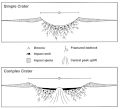Victoria Island structure
| Victoria Island structure | |
|---|---|
| Impact crater/structure | |
| Confidence | probable[1] |
| Diameter | 5.5 kilometers (3.4 mi) |
| Exposed | No |
| Drilled | No |
| Location | |
| Coordinates | 37°53′24″N 121°32′06″W / 37.89°N 121.535°W |
| Country | United States |
| State | California |
| District | San Joaquin County |
The Victoria Island structure is a 5.5 km (3 mi) bowl-shaped structure buried in the shale sediments of the Sacramento-San Joaquin River Delta, 12 miles (19 km) west of Stockton, California. The circular structure is part of a former sea bed, and lies 1,490–1,600 meters (4,890–4,250 ft) below sea level.[2]
Discovered during oil exploration and reported at the Lunar and Planetary Science Conference in Houston, Texas, in March 2007, it is thought to be a buried impact crater formed between 37 and 49 million years ago.[3][4]
Victoria Island, which the structure is named for, is in the San Joaquin River Delta at approximately 37°53′24″N 121°32′06″W / 37.890°N 121.535°W.[5] The current publications do not list a more precise location for the impact structure than the island.
See also
[edit]References
[edit]- ^ Rajmon, D. "Impact Database 2009.2". Impact Field Studies Group. entry for "Victoria Island". Retrieved 2010-03-16.
- ^ Paul Rincon (2007). 'Crater' spied under California, BBC News
- ^ Spevack, S. C., Morrow, J. R., Spevack, B. Z. (2007). "3-D seismic and well log analyses of the Victoria Island Structure, a Potential Buried Impact Crater, San Joaquin County, California" (.PDF). Lunar and Planetary Science Conference XXXVIII. Retrieved 2009-09-17.
{{cite web}}: CS1 maint: multiple names: authors list (link) - ^ Roach, John (2007-03-27). "Giant Meteorite Hit Ancient California, Crater Study Suggests". National Geographic News. National Geographic Society. Archived from the original on April 4, 2007. Retrieved 2009-09-01.
- ^ "Victoria Island". Geographic Names Information System. United States Geological Survey, United States Department of the Interior.
External links
[edit]



